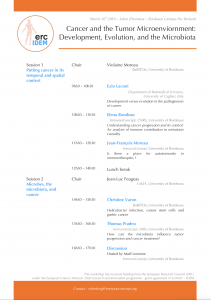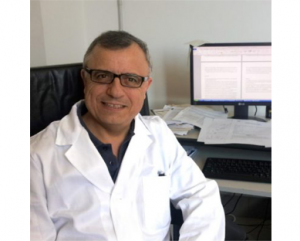
- This event has passed.
Workshop with Ezio Laconi (Cagliari) – Cancer and the Tumor Microenvironment: Development, Evolution, and the Microbiota
26 March 2019 | 9 h 00 min - 18 h 00 min

The ERC IDEM is proud to host this one day workshop with Ezio Laconi on Cancer and the Tumor Microenvironment: Development, Evolution, and the Microbiota.
Workshop program
Plenary Speaker
Ezio Laconi (Department of Biomedical Sciences and Biotechnology, University of Cagliari, Italy)
Development versus evolution in the pathogenesis of cancer
It is rather surprising that the terms “development” and “evolution” are both used, often interchangeably, to describe the unfolding of carcinogenic process. However, there is increasing awareness on the essential difference in the meaning of these two definitions with reference to neoplastic disease. Evidence will be discussed to suggest that the concepts of development and evolution are both pertinent to describe carcinogenesis; however, they appropriately apply to distinct phases of the multistep process. Such distinction bears important implications for disease analysis and management.
Speakers
Elena Rondeau (ImmunoConcept, CNRS, University of Bordeaux)
Understanding cancer progression and its control: An analysis of immune contribution to metastasis causality
Ongoing progress in cancer research is improving our comprehension of the spatial and temporal complexity of tumour progression, indeed characterised by the pleiotropic involvement of the tissue environment at different stages of the illness (Plutynski 2018). While supplementing our thorough appreciation of the cell-intrinsic properties of transformation, these advances still face serious difficulties, such as those linked to tumour recurrence and systemic spread.
Metastasis is currently the leading cause of cancer mortality, correlating with disease severity and resistance to conventional therapy. Beyond its accepted description as a multistep process resulting in the development of secondary tumours at distant sites, certain observations remain partly unexplained and conceptually challenging. For instance the report of organ specificity for secondary growth, describing the apparent tropism of primary tumour cells for particular metastatic tissues, complicates the understood causality of cancer cell dissemination and subsequent implantation.
The “seed and soil” theory of metastasis, initially coined by Paget (1889), stipulates that such patterns can be explained by favourable interactions between circulating tumour cells (the “seed”) and specific microenvironments encountered during their migration (the “soil”). While maintaining an illustrative role, its exact premises and implications may benefit from a revisited analysis in the light of recent clinical and experimental observations. In particular, the evidence of distant “pre-metastatic niche” preparation, involving both tumour-derived factors and pre-existing host components hijacked by the malignant context, could defy the explicative power of the analogy.
Triggered by these considerations is the objective to decipher the implication of the immune system in cancer progression, given the delicate balance between its protective and pro-tumoral activities. Indeed pre-metastatic processes are frequently associated with immune cell recruitment, inflammatory signalling and structural remodelling, with a direct contribution of these features to tumour development and secondary seeding. As a matter of fact, those populations of suppressive and pro-invasive immune cells may actively encourage “seed” persistence and enable distant metastasis by establishing a hospitable and/or attractive environment in future “soils”.
Hence the pressing question of determining the exact role of host immunity in metastasis causality: to what extent, and how, do the immune actors of cancer progression contribute to the preparation and specificity of secondary sites? Underlying the conceptual framework of the “seed and soil” hypothesis, would this reflection help better understand the relative contributions of pro-metastatic factors, and how may it affect practical and therapeutic considerations?
In my research, I propose to address this issue from both a conceptual and an experimental point of view, through a case study of metastatic tropism in a mouse model of breast cancer known to specifically disseminate to the lungs. The characteristics of a subset of pro-tumoral myeloid cells are monitored through the course of tumour evolution and in differential environments, in an attempt to better understand their early accumulation at pre-metastatic sites.
Jean-François Moreau (ImmunoConcept, University of Bordeaux)
Is there a place for autoimmunity in immunotherapies ?
The immunotherapies seems to be the magic bullet to cure patients with some types of cancer. While the mutation load is coming to mind and is sustained by many studies to explain the increased immune response toward the tumor, it should not be overlooked that ipilimumab (targeting CD152/CTLA-4) or nivolumab (targeting PD-1) or atezolizumab (targeting PD-L1) among others, do alter the fine tuning of the level of autoreaction within the immune system which is deeply encryted into the functionning of the adaptive immune system. Usually considered as the underpinnings of the tolerance mechanisms, we will explain the basis of it and its potential consequences in the natural evolution of cancer and in the response to the today immunotherapies in the field of cancer.

Christine Varon (BaRITOn, University of Bordeaux)
Helicobacter infection, cancer stem cells and gastric cancer
Gastric cancer is the third leading cause of cancer mortality in the world. Chronic infection with Helicobacter pylori, a class 1 carcinogen, is the main infectious cause of cancer in the world, being responsible for more than 90% of the non-cardia gastric carcinomas (GC). The recent discovery of the existence of cancer stem cells (CSC) at the origin of the GC has opened new perspective for the development of new therapy targeting gastric CSCs. Our group is focused on the study of the cellular and molecular mechanisms leading to the emergence of CSC in GC induced by chronic infection with H. pylori. We have developed mouse xenograft models of patient’s derived primary GC, allowing to reproduce in mice tumours like those of the patients. Using these models as well as in vitro tumorspheres assays, we have characterized some cell surface markers of enrichment of CSC, among them CD44 and ALDH. In a mouse model of H. pylori-induced gastric carcinogenesis, we have shown that gastric CSCs may originate from both local or bone-marrow derived (BM) stem cells. In this context, chronic infection with H. pylori induced an epithelial to mesenchymal transition (EMT) leading to the emergence of CD44+ cells possessing mesenchymal and stem cell properties. These cells participated to metaplastic and dysplastic lesions to give rise, after additional epigenetic and mutational events, to the emergence of CSCs and adenocarcinoma. Based on these complementary in vitro and in vivo models, our current research aims to characterize the signaling pathways involved during H. pylori-induced EMT and CD44+ cells, and driving the CSC self-renewal and tumorigenic properties, in order to further specifically target them and inhibit CSC properties and GC progression.
Thomas Pradeu (ImmunoConcept, CNRS, University of Bordeaux)
“How can the microbiota influence tumor progression and cancer treatment?”
It is increasingly recognized that almost all organisms are hosts to myriads of microbes, which often play functional roles in the host. Recent research has revealed that the microbiota could have a strong impact on cancer development (Zitvogel et al., 2018). The microbiota plays a role in carcinogenesis, both locally and at distant sites. Furthermore, the microbiota can influence how the host responds to anti-cancer therapies. Several of these therapies, including chemotherapy and several immunotherapies, show reduced efficacy in germ-free mice as well as in mice treated with broad-spectrum antibiotics, or in mice lacking specific bacteria that stimulate the immune system (Iida et al., 2013; Sivan et al., 2015; Vétizou et al., 2015; Viaud et al., 2013). In parallel, it was observed in patients that certain bacteria had a positive impact on host responses to some immunotherapies. Initial correlational observations were then confirmed causally, by FMT from patients to mice, which suggested that “responding” and “non-responding” phenotypes could be transferred from humans to mice, with some particular bacteria playing a crucial role in this process (Gopalakrishnan et al., 2018; Matson et al., 2018; Routy et al., 2018).
This research raises many interesting issues, at the interface between biology, medicine, and philosophy:
i) Should the influence of the microbiota on tumor development be considered as one illustration among others of the increasingly acknowledged role of the tumor microenvironment (TME)?
ii) Do such studies demonstrate mere correlation, or causality? (Thomas and Jobin, 2015) What are the mechanisms underlying the influence of the microbiota on tumor development, and what is the role of the immune system in this process?
iii) Is it possible to better characterize the specific bacteria that seem to have a positive role in host’s response to cancer treatment?
iv) More generally, what does the impact of the microbiota on cancer development tell us about our definition of cancer?
References
Gopalakrishnan, V., Spencer, C.N., Nezi, L., Reuben, A., Andrews, M.C., Karpinets, T.V., Prieto, P.A., Vicente, D., Hoffman, K., Wei, S.C., et al. (2018). Gut microbiome modulates response to anti–PD-1 immunotherapy in melanoma patients. Science 359, 97–103.
Iida, N., Dzutsev, A., Stewart, C.A., Smith, L., Bouladoux, N., Weingarten, R.A., Molina, D.A., Salcedo, R., Back, T., Cramer, S., et al. (2013). Commensal bacteria control cancer response to therapy by modulating the tumor microenvironment. Science 342, 967–970.
Matson, V., Fessler, J., Bao, R., Chongsuwat, T., Zha, Y., Alegre, M.-L., Luke, J.J., and Gajewski, T.F. (2018). The commensal microbiome is associated with anti–PD-1 efficacy in metastatic melanoma patients. Science 359, 104–108.
Routy, B., Chatelier, E.L., Derosa, L., Duong, C.P.M., Alou, M.T., Daillère, R., Fluckiger, A., Messaoudene, M., Rauber, C., Roberti, M.P., et al. (2018). Gut microbiome influences efficacy of PD-1–based immunotherapy against epithelial tumors. Science 359, 91–97.
Sivan, A., Corrales, L., Hubert, N., Williams, J.B., Aquino-Michaels, K., Earley, Z.M., Benyamin, F.W., Lei, Y.M., Jabri, B., Alegre, M.-L., et al. (2015). Commensal Bifidobacterium promotes antitumor immunity and facilitates anti-PD-L1 efficacy. Science 350, 1084–1089.
Thomas, R.M., and Jobin, C. (2015). The Microbiome and Cancer: Is the ‘Oncobiome’ Mirage Real? Trends Cancer 1, 24–35.
Vétizou, M., Pitt, J.M., Daillère, R., Lepage, P., Waldschmitt, N., Flament, C., Rusakiewicz, S., Routy, B., Roberti, M.P., Duong, C.P.M., et al. (2015). Anticancer immunotherapy by CTLA-4 blockade relies on the gut microbiota. Science 350, 1079–1084.
Viaud, S., Saccheri, F., Mignot, G., Yamazaki, T., Daillère, R., Hannani, D., Enot, D.P., Pfirschke, C., Engblom, C., Pittet, M.J., et al. (2013). The intestinal microbiota modulates the anticancer immune effects of cyclophosphamide. Science 342, 971–976.
Zitvogel, L., Ma, Y., Raoult, D., Kroemer, G., and Gajewski, T.F. (2018). The microbiome in cancer immunotherapy: Diagnostic tools and therapeutic strategies. Science 359, 1366–1370.





